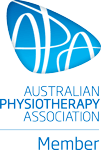Patella-Femoral (Kneecap) Pain
Patellofemoral pain is a common knee problem. If you have this condition, you feel pain under and around your kneecap. The pain can get worse when you’re active or when you sit for a long time. You can have the pain in one or both knees.
Also known commonly as “runners knee” symptoms include microscopic tearing of supporting tissue around the kneecap as well as inflammation of the under surface of the kneecap.
Some causes may include mal-tracking of the patella related to tight muscles, weak stabilizing muscles and poor foot biomechanics.
Sporting activities which can lead to the development of patello-femoral pain include running, walking, jumping and cycling.
Knee symptoms include pain over the front of the knee which may be brought on by prolonged sitting or going up or downstairs.
Treatment for patello-femoral pain involves correcting the factors which have led to the mal-tracking. This may involve stretches and massage to tight muscles and fascia, mobilisations to the patella and exercises to strengthen weak stabilising muscles.
Ice and anti-inflammatories may be used to reduce pain and inflammation.
Strapping or sports taping can be very effective in correcting the patella position in order to retrain the muscles required to stabilize it. Known as McConnell taping, it was developed by a physiotherapist who led research into this area. She also describes a series of specific exercises which aim to strengthen particular muscles (called VMO) on the inside of the knee to stabilize the patella.
If poor foot biomechanics are indicated as part of the problem, this may also need to be addressed. If the foot rolls in too much (pronates) this can cause a ‘turning in’ (internal rotation) of the lower leg leading to altered forces through the knee.
Rehabilitation of this problem can be lengthy so following the correct stretching and strengthening program until the knee is fully stable is recommended to prevent reoccurrences. Your Physiotherapist can advise you on the best exercises to overcome this injury.
Call 02 9681 3467 or Click Here To Book An Appointment





